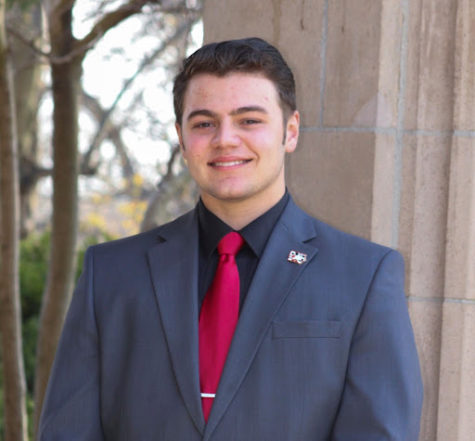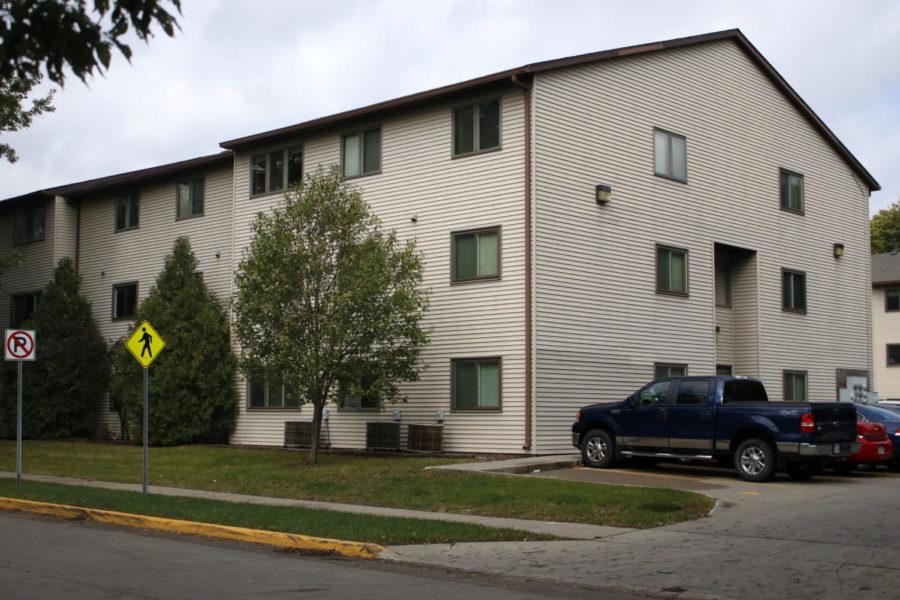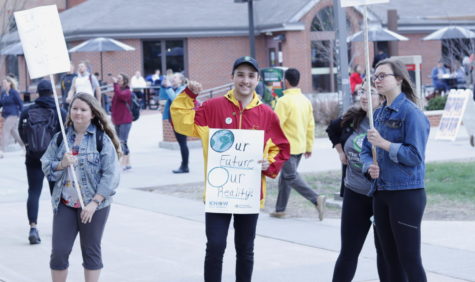Meet the candidates aiming to represent off-campus students
Gillian Holte/Iowa State Daily
Apartments on Storm Street.
Six students are running to fill the 11 seats available to represent the United Residents Off-Campus as members of the Student Government senate. There will be five seats vacant for the constituency in this election.
Student Government is a student organization that exists to serve and represent all students according to the student organization database. Other student organizations can apply for funding through Student Government, which according to their website, has roughly $2.6 million in annual student fee revenue to distribute.
The Student Government elections will take place March 7-8. Ballots will be emailed to students’ Iowa State email addresses.
Candidates
Stacia Drey, a sophomore in both political science and journalism, currently represents students in off-campus housing within the senate.
Kolton Eisma, a sophomore in agricultural business, currently serves as a residence hall senator.
Alex Cecil, a senior in agronomy, currently represents students in off-campus housing within the senate.
David Heidenreich, a junior in mechanical engineering, currently serves as a residence hall senator.

Why do you want to return to/join Student Government?
Drey
“My first year it was more getting used to how everything works and getting to know the people in it; now I am more experienced and will be able to do more.”
Eisma
“I’ve enjoyed my time getting to reach out to constituencies and speak with people about things that are concerning to students, and, for now, since I’m one of the residential hall senators […] I am hoping I can take that experience that I’ve developed the past year and apply it towards the UROC position that I am running for.”
Heidenreich
“I was a part of IRHA my freshman and sophomore year […] Truthfully, I like representing the residence halls. I like the people that I am around; I like the ability to be a part of committees. I really enjoy being a part of the health and wellness committee that I am in right now, I feel like I can do a lot of good there.”
Cecil
“I want to return to Student Government because despite having already been in the organization for four years, I feel there is still many more ways I can help the students, and due to my experience, I can connect with more resources and use that to share my knowledge with new senators. I want to return not only to benefit students but to also help teach new members how to better assist their constituents.”

Vo
“I want to continue my position as I still have a lot I want to be involved with, and I enjoy investing my time into Student Government related initiatives. I became a senator to be a voice for marginalized communities and want to continue doing so.”
What was your biggest accomplishment as a member of Student Government?
Drey
“Getting involved on campus and helping out different people’s groups. Back in fall, we helped with tailgates where we handed out clear fanny packs with Liquid I.V. and things to combat alcohol-related issues–just making sure people were still having fun in a safe and responsible way.”
Eisma
“I’d like to say my biggest accomplishment for my time during senate this past year was working on a document with the help of David Heidenreich and Quinn Margrett. The three of us are the current three residential hall senators, and we developed a document that allows us to properly write down our reports for Student Government and report it back to the IRHA [Inter-Residence Hall Association].”
Heidenreich
“I’m working a lot with trying to plan a food drive to help SHOP [Students Helping Our Peers] with food. They had a lot less traffic because of COVID, but now that it is dying down, a lot of people are coming back in and they are not having enough food. Although it is a big project that I am planning for next year, I am planning to do a whole-campus food drive.”
Cecil
“I joined the senate in the fall of this year, but before that, I was on the supreme court. That’s where I started, and when I joined, it didn’t really exist just because there hadn’t been nominations or anything like that. Myself and the five others that started who joined at that point kind of rebuilt it; we rewrote a lot of the rules and went through them, so I’d say that’s like my biggest thing.

(Courtesy of David Heidenreich)
Vo
“I am one of the leaders helping plan a DEI [diversity, equity and inclusion] funding event this March 23. Through this event, identity-based organizations have the opportunity to learn the specific steps to getting funding from Student Government and are able to get answers to any questions they have about how things will apply to them. This event will help a lot of student organizations that don’t know where to start with when it comes to receiving funding for their club, along with learning more about Student Government and our diversity, equity, and inclusion committee.”
What are the biggest issues facing your constituents, and how will you address them?
Drey
“From listening to what other people have said, [it is] just making sure that they know what is going on on campus even though they live off campus. Because they live off campus, they can often be left behind—letting people know about things like movies at the MU and After Dark.”
Eisma
“I would say the current constituency’s biggest issues are just the lack of transparency between senate and Student Government as well as bringing stuff back to IRHA and hoping that we can bring it back to the residential hall senates and hall meetings. Just to make sure that [throughout] all layers of bureaucracy everyone knows what is going on because it is a pretty large campus.”
Heidenreich
“I’m going to go with food insecurity, because I feel like that is a big thing that affected people regardless of—anything. So, trying to help people have stable food, meal planning, access to dining halls.”
Cecil
“The leasing is something I want to focus on. I’ve started looking at how I can work with other universities to work on that because it comes down to the legislative issue where leasing companies aren’t required to have an overlap option where you don’t end up homeless unless you renew at the same place, so I want to work to mitigate that or have space on campus where we can help with that.”
Vo
“The biggest issue our constituents are facing as off-campus residents is our connection to the campus community and the overall awareness of Student Government. Many students don’t know of the opportunities or information available, whether it be funding their student organization, where their student fees go and get invested in, what future events are coming up, what mental health resources cater to them […] I want to address this issue by continuous outreach to student organizations throughout the year through social media and interpersonal conversations.”

Why should students vote for you?
Drey
“I think that students should vote for me because now that I have a year under my belt, I know more about how it works and what I can do. I want to continue to be involved on campus and make Iowa State a better place.”
Eisma
“Students should vote for me for the three main points that I am focusing on in my time moving forward for Student Government, which are: advocacy for disability awareness, outreach for constituencies and financial transparency.”
Heidenreich
“I’ve had three years now representing IRHA [Inter-Residence Hall Association]; I’ve been in residence halls all three years. I’ve talked with a wide variety of people and made it to a lot of different hall meetings. I feel that I am outspoken enough to be able to speak on issues and represent people in a loud enough voice […] I feel like a lot of groups need that; their voices are quieter, and my voice is loud enough to represent them.”
Cecil
“I like talking to people, I like hearing new ideas and most of what I’ve worked on in senate, even though I’ve been there for a short amount of time so far, has been helping other people and their ideas and then to get things moving on like helping students.”
Vo
“I want to represent the student body’s voice and make Iowa State a safe and comfortable space for everyone, while also building a larger sense of community. With the position as a senator, I want to prioritize students first with their needs and accommodations. Students should vote for me because of my heavy involvement within not only Student Government, but with other organizations on campus such as being a facilitator in Color of Love and a member of the Vietnamese Student Association.”
What are your qualifications for being a senator?
Drey
“My past year [in Student Government] is the biggest one. I am also pretty good at public speaking because I am involved on campus. I have also worked with GSTV [Greenlee School TV], and I work at the Iowa State Daily. I think that public speaking is a skill that is important for a senator to have when they are meeting with their constituents.”

(Courtesy of Alex Cecil)
Eisma
“I’d like to say my qualifications are having one year of experience now of being the residential hall senator as well as being a part of the rules and finance committees. In the rules committee, we focus on looking at the bills to make sure […] there are no ulterior motives or that they will do as they say within the bill.”
Heidenreich
“I’ve been at this school for a few years. I also had a few leadership roles in high school, and in my clubs and activities I have found that people tend to gravitate towards me because my voice can be heard. I have also been in IRHA before.”
Cecil
“I know all the bylaws and all the rules, and I’ve worked to give my opinion through the supreme court on how to write new rules. Right now I’m on rules committee, and we’re looking through all the bylaws and rules […] While not all of those have been written by me, I have viewed and helped write a lot of them and been a big part of that.”
Vo
“I am qualified to be a senator because I am finishing up my first term serving within UROC [United Residents Off-Campus], and have familiarized myself with senate meetings and the run down of how Student Government works. I am also part of many student organizations that StuGov would oversee when it comes to funding, and would therefore give insight on how students currently feel about what resources they are and are not receiving. I see it from both sides as a student part of a marginalized community and as a senator with the power to introduce and vote on bills.”
Your donation will support the student journalists of the Iowa State Daily. Your contribution will allow us to purchase equipment, send our student journalists to conferences and off-set their cost of living so they can continue to do best-in-the-nation work at the Iowa State Daily.















